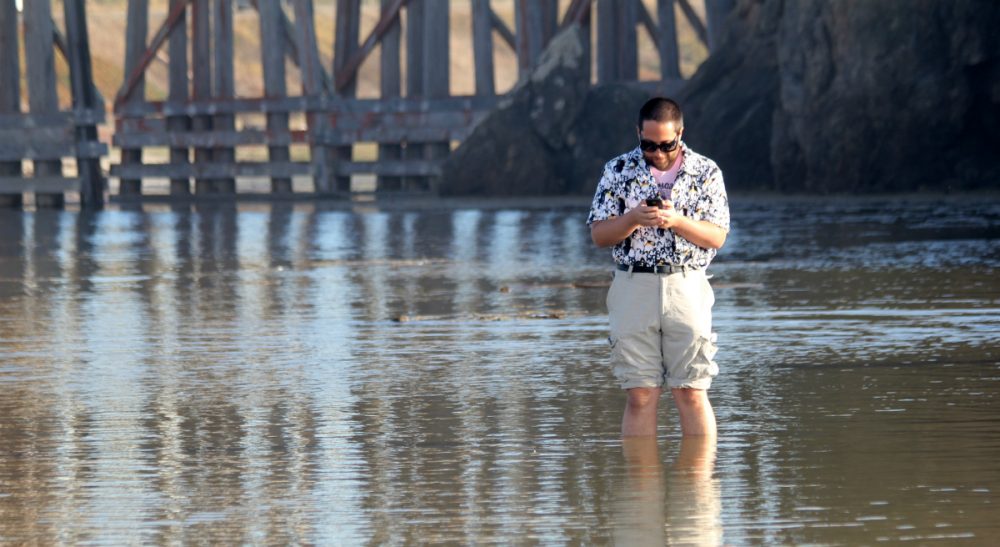Advertisement
Look Up! Small Screens, Big Distractions And The Lost Art Of Knowing Your Place

Are you the kind of person who, like me, sometimes tunes out while on a stroll and sends a text message instead of paying attention to the trees, the traffic, your fellow passers-by? What about spending an inordinate amount of time online indoors? Hours vanish as I, tethered to some device with a screen, sit disconnected from physical space, oblivious to the atmosphere around me. No sense of the light, the air, the passing of time.
Hours vanish as I, tethered to some device with a screen, sit disconnected from physical space, oblivious to the atmosphere around me.
At such times, it’s as if I’m having an out of body, transcendental experience — but one that’s not particularly spiritual or even good for me. Too often, I lose my sense of place. And that worries me.
Much has been written about the ways our devices and other digital distractions conspire to keep us from interacting with each other. But what of our interactions with place? That inward-turning posture of checking our devices — call it the “iPhone hunch” — not only wards off conversation, it prevents us from being aware of the spaces we pass through.
Certainly, there’s no harm in daydreaming while driving to lacrosse practice, or letting our minds wander while at work. I've got no beef with mental downtime. But as we are increasingly able to have experiences disconnected from actual time and space, a sense of placelessness creeps in. We can play a video game while riding the Red Line, or chat with a friend who lives thousands of miles away while pushing a stroller through Boston Common. But when we do that, where, exactly, are we?
I’m worried about this spatial illiteracy. What is the experiential value of a road trip with the kids if, instead of looking out the window, they are staring at iPads?
The healing effects of even a short walk in a park have been well-documented. But if people aren’t able to focus on that walk because of the siren song of updating their Facebook status or returning an email, that experience becomes meaningless. If they're not able to focus on that walk because they were so distracted they were hit by a car, fell into a ditch or crashed into another pedestrian, that's not so good, either.
I worry about another kind of collision, too, that of the virtual world with the real one. Video games contribute to this erosion of a distinct sense of place. For some gamers, “nature” is not a hike in the Arizona desert, but a “walk,” via an avatar, through a richly-detailed desert world – often a bombed out, post-apocalyptic one. Pixels are not place.
We can play a video game while riding the Red Line, or chat with a friend who lives thousands of miles away while pushing a stroller through Boston Common. But when we do that, where, exactly, are we?
According to the University of Michigan Institute for Social Research, children under 13 spend less than 30 minutes a week in unstructured outdoor play. How many generations will pass before humans can’t be bothered to distinguish between feeling the wind and hearing the crunch of fresh snow as they snowboard on a cold morning, and some 3-D simulacrum of being on a mountain in winter?
We are on the cusp of inviting Google Glass and Oculus Rift virtual reality headsets into our lives. These and other technologies will make it even easier to “be” elsewhere while simultaneously being “here.”
Before we lose ourselves to placelessness, let us celebrate the uniqueness of the pond or puddle, let us look up and gaze upon the full moon. Let us be thankful for face time with friends, not Facetime.
As for me, I vow to be more present. As a start, I’m going to try to stop multi-tasking. I’ll fail, so the next time you see me walking and texting, please, jab me in the ribs, and tell me to watch where I’m going. Ethan, stop. Put away the device. Breathe. Be where you are.
Related:
